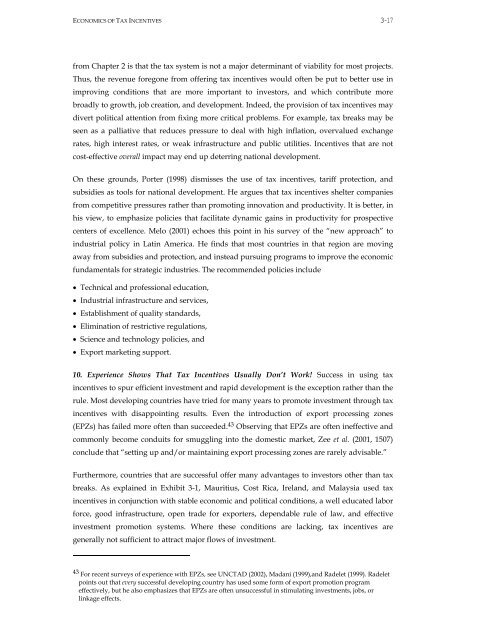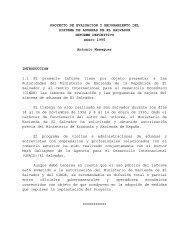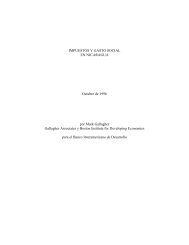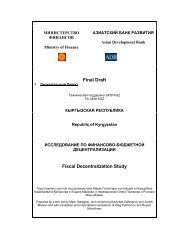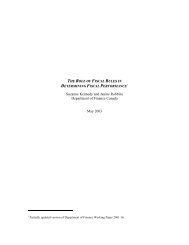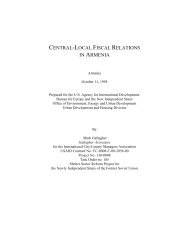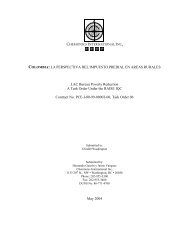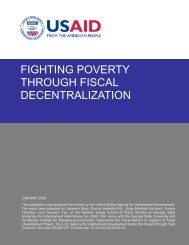Effectiveness and Economic Impact of Tax Incentives in the SADC ...
Effectiveness and Economic Impact of Tax Incentives in the SADC ...
Effectiveness and Economic Impact of Tax Incentives in the SADC ...
You also want an ePaper? Increase the reach of your titles
YUMPU automatically turns print PDFs into web optimized ePapers that Google loves.
ECONOMICS OF TAX INCENTIVES 3-17<br />
from Chapter 2 is that <strong>the</strong> tax system is not a major determ<strong>in</strong>ant <strong>of</strong> viability for most projects.<br />
Thus, <strong>the</strong> revenue foregone from <strong>of</strong>fer<strong>in</strong>g tax <strong>in</strong>centives would <strong>of</strong>ten be put to better use <strong>in</strong><br />
improv<strong>in</strong>g conditions that are more important to <strong>in</strong>vestors, <strong>and</strong> which contribute more<br />
broadly to growth, job creation, <strong>and</strong> development. Indeed, <strong>the</strong> provision <strong>of</strong> tax <strong>in</strong>centives may<br />
divert political attention from fix<strong>in</strong>g more critical problems. For example, tax breaks may be<br />
seen as a palliative that reduces pressure to deal with high <strong>in</strong>flation, overvalued exchange<br />
rates, high <strong>in</strong>terest rates, or weak <strong>in</strong>frastructure <strong>and</strong> public utilities. <strong>Incentives</strong> that are not<br />
cost-effective overall impact may end up deterr<strong>in</strong>g national development.<br />
On <strong>the</strong>se grounds, Porter (1998) dismisses <strong>the</strong> use <strong>of</strong> tax <strong>in</strong>centives, tariff protection, <strong>and</strong><br />
subsidies as tools for national development. He argues that tax <strong>in</strong>centives shelter companies<br />
from competitive pressures ra<strong>the</strong>r than promot<strong>in</strong>g <strong>in</strong>novation <strong>and</strong> productivity. It is better, <strong>in</strong><br />
his view, to emphasize policies that facilitate dynamic ga<strong>in</strong>s <strong>in</strong> productivity for prospective<br />
centers <strong>of</strong> excellence. Melo (2001) echoes this po<strong>in</strong>t <strong>in</strong> his survey <strong>of</strong> <strong>the</strong> “new approach” to<br />
<strong>in</strong>dustrial policy <strong>in</strong> Lat<strong>in</strong> America. He f<strong>in</strong>ds that most countries <strong>in</strong> that region are mov<strong>in</strong>g<br />
away from subsidies <strong>and</strong> protection, <strong>and</strong> <strong>in</strong>stead pursu<strong>in</strong>g programs to improve <strong>the</strong> economic<br />
fundamentals for strategic <strong>in</strong>dustries. The recommended policies <strong>in</strong>clude<br />
• Technical <strong>and</strong> pr<strong>of</strong>essional education,<br />
• Industrial <strong>in</strong>frastructure <strong>and</strong> services,<br />
• Establishment <strong>of</strong> quality st<strong>and</strong>ards,<br />
• Elim<strong>in</strong>ation <strong>of</strong> restrictive regulations,<br />
• Science <strong>and</strong> technology policies, <strong>and</strong><br />
• Export market<strong>in</strong>g support.<br />
10. Experience Shows That <strong>Tax</strong> <strong>Incentives</strong> Usually Don’t Work! Success <strong>in</strong> us<strong>in</strong>g tax<br />
<strong>in</strong>centives to spur efficient <strong>in</strong>vestment <strong>and</strong> rapid development is <strong>the</strong> exception ra<strong>the</strong>r than <strong>the</strong><br />
rule. Most develop<strong>in</strong>g countries have tried for many years to promote <strong>in</strong>vestment through tax<br />
<strong>in</strong>centives with disappo<strong>in</strong>t<strong>in</strong>g results. Even <strong>the</strong> <strong>in</strong>troduction <strong>of</strong> export process<strong>in</strong>g zones<br />
(EPZs) has failed more <strong>of</strong>ten than succeeded. 43 Observ<strong>in</strong>g that EPZs are <strong>of</strong>ten <strong>in</strong>effective <strong>and</strong><br />
commonly become conduits for smuggl<strong>in</strong>g <strong>in</strong>to <strong>the</strong> domestic market, Zee et al. (2001, 1507)<br />
conclude that “sett<strong>in</strong>g up <strong>and</strong>/or ma<strong>in</strong>ta<strong>in</strong><strong>in</strong>g export process<strong>in</strong>g zones are rarely advisable.”<br />
Fur<strong>the</strong>rmore, countries that are successful <strong>of</strong>fer many advantages to <strong>in</strong>vestors o<strong>the</strong>r than tax<br />
breaks. As expla<strong>in</strong>ed <strong>in</strong> Exhibit 3-1, Mauritius, Cost Rica, Irel<strong>and</strong>, <strong>and</strong> Malaysia used tax<br />
<strong>in</strong>centives <strong>in</strong> conjunction with stable economic <strong>and</strong> political conditions, a well educated labor<br />
force, good <strong>in</strong>frastructure, open trade for exporters, dependable rule <strong>of</strong> law, <strong>and</strong> effective<br />
<strong>in</strong>vestment promotion systems. Where <strong>the</strong>se conditions are lack<strong>in</strong>g, tax <strong>in</strong>centives are<br />
generally not sufficient to attract major flows <strong>of</strong> <strong>in</strong>vestment.<br />
43 For recent surveys <strong>of</strong> experience with EPZs, see UNCTAD (2002), Madani (1999),<strong>and</strong> Radelet (1999). Radelet<br />
po<strong>in</strong>ts out that every successful develop<strong>in</strong>g country has used some form <strong>of</strong> export promotion program<br />
effectively, but he also emphasizes that EPZs are <strong>of</strong>ten unsuccessful <strong>in</strong> stimulat<strong>in</strong>g <strong>in</strong>vestments, jobs, or<br />
l<strong>in</strong>kage effects.


